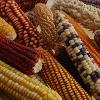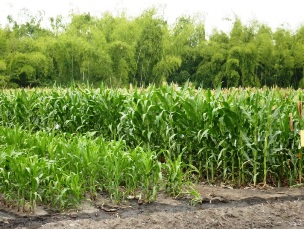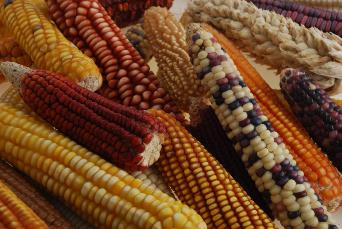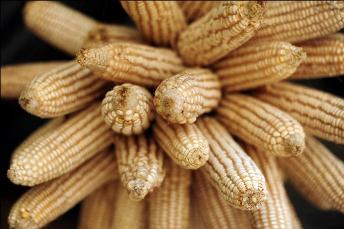
Texcoco, Mexico – The CGIAR Generation Challenge Programme (GCP) announced today that it has received a major donation of maize genetic resources comprised of a portion of the Maize Allelic Diversity platform developed by Syngenta. This will now be available to researchers worldwide through the International Maize and Wheat Improvement Center (CIMMYT). The Syngenta Foundation for Sustainable Agriculture (SFSA) played a key role in facilitating the donation.![]() Download PDF | HTML
Download PDF | HTML
Media Release – 29 February 2012
New genomic resources for maize breeding
Syngenta’s donation of a transgenic-free allelic diversity platform will accelerate maize breeding
Texcoco, Mexico – The CGIAR Generation Challenge Programme (GCP) announced today that it has received a major donation of maize genetic resources comprised of a portion of the Maize Allelic Diversity platform developed by Syngenta.  This will now be available to researchers worldwide through the International Maize and Wheat Improvement Center (CIMMYT). The Syngenta Foundation for Sustainable Agriculture (SFSA) played a key role in facilitating the donation.
This will now be available to researchers worldwide through the International Maize and Wheat Improvement Center (CIMMYT). The Syngenta Foundation for Sustainable Agriculture (SFSA) played a key role in facilitating the donation.
"This donation is very opportune for public research: and because producing this kind of genetic material needs several generations, and takes a considerable amount of time and resources, this donation represents a unique tool to boost identifying new alleles to improve maize worldwide," observes Dr Jean-Marcel Ribaut, GCP Director. "Our broad network of partners, particularly CIMMYT with a global mandate, will ensure wide distribution and impact, especially in developing countries."
 Current breeding methods have seen a continued rise in maize yields, making it the largest crop in the Americas, with an annual production of over 600 million tons, of about 867.5m tons worldwide. Additionally, emerging science is opening new avenues to help researchers understand and improve crops. Novel strategies for identifying genes and quantitative trait loci (QTLs) are proving successful. However, quantitative validation of these discoveries for predictive use remains difficult mainly because they are often made in a single genetic background in non-elite germplasm. Precise introgression of discrete chromosomal segments from selected lines into varied genetic backgrounds helps to overcome this hurdle. Consequently, the Syngenta Maize Allelic Diversity Platform was developed to provide a catalogue of material in elite near-isogenic backgrounds that could be queried and evaluated for effects in phenotypic variation. The allelic diversity panel donated currently comprises 1,282 near-inbred lines derived from 18 donors (diverse inbreds and landraces) crossed with B73, a publicly accessible maize line used as a reference line in a lot of genetic studies. Each inbred has been verified for freedom from adventitious presence of transgenic events. Valid requests will be honoured with 12 seeds per accession to ensure a sufficient supply for the widest distribution. A limited fee may also be charged for each request to recover logistics costs.
Current breeding methods have seen a continued rise in maize yields, making it the largest crop in the Americas, with an annual production of over 600 million tons, of about 867.5m tons worldwide. Additionally, emerging science is opening new avenues to help researchers understand and improve crops. Novel strategies for identifying genes and quantitative trait loci (QTLs) are proving successful. However, quantitative validation of these discoveries for predictive use remains difficult mainly because they are often made in a single genetic background in non-elite germplasm. Precise introgression of discrete chromosomal segments from selected lines into varied genetic backgrounds helps to overcome this hurdle. Consequently, the Syngenta Maize Allelic Diversity Platform was developed to provide a catalogue of material in elite near-isogenic backgrounds that could be queried and evaluated for effects in phenotypic variation. The allelic diversity panel donated currently comprises 1,282 near-inbred lines derived from 18 donors (diverse inbreds and landraces) crossed with B73, a publicly accessible maize line used as a reference line in a lot of genetic studies. Each inbred has been verified for freedom from adventitious presence of transgenic events. Valid requests will be honoured with 12 seeds per accession to ensure a sufficient supply for the widest distribution. A limited fee may also be charged for each request to recover logistics costs.
 “Our hope is that the breeding programmes resulting from this donation will also help smallholder farmers,” says Dr Mike Robinson, Chief Science Advisor at the Syngenta Foundation. “Maize is a key crop in many developing countries. Yields need to rise significantly there in order to improve food security. That is why we donated the funding required to test and multiply the maize lines made available by Syngenta.”
“Our hope is that the breeding programmes resulting from this donation will also help smallholder farmers,” says Dr Mike Robinson, Chief Science Advisor at the Syngenta Foundation. “Maize is a key crop in many developing countries. Yields need to rise significantly there in order to improve food security. That is why we donated the funding required to test and multiply the maize lines made available by Syngenta.”
As a means to facilitate this, SFSA explicitly requires and encourages unencumbered reporting of scientific findings related to the use of the donated materials. Those who access the genetic resources donated by Syngenta will agree not to obtain intellectual property rights on the material or knowledge gained through their use of the donated materials.
"We are delighted to have access to these resources,” says Dr Kevin Pixley, CIMMYT’s Director of Genetic Resources. “The plant material will greatly aid researchers to identify alleles relevant for maize breeding."
- For more information, please contact This email address is being protected from spambots. You need JavaScript enabled to view it.
- Rapid facts and figures on maize
GCP is a CGIAR Challenge Programme created in 2003 as a time-bound 10-year initiative. Its mission is to use genetic diversity and advanced plant science to improve crops by adding value to breeding for drought-prone and harsh environments. This is achieved through a network of more than 200 partners drawn from CGIAR Centres and Programmes, academia, regional and national research programmes, and capacity enhancement to assist developing-world researchers to access technologies and to tap into a broader and richer pool of plant genetic diversity.
The Syngenta Foundation for Sustainable Agriculture creates value for resource-poor smallholder farmers in developing countries through innovation in sustainable agriculture and the activation of value chains. By helping smallholders become more professional growers, SFSA achieves added value for rural communities, and improves food security in sustainable ways. The Foundation is based in Basel, Switzerland, and operates in Africa, Asia and Latin America.
CIMMYT is a non-profit research and training CGIAR Centre headquartered in Mexico whose mission is to sustainably increase the productivity of maize and wheat systems to ensure global food security and reduce poverty.CIMMYT works with and brings together public research and extension organizations, private companies, advanced research institutes, NGOs, and farmer associations worldwide. This network is maintained by over 105 specialised research and 500 support staff from at least 40 countries, working on a yearly budget of about USD 50 million. The Center is funded by international and regional development agencies, national governments, private foundations and the private sector.


